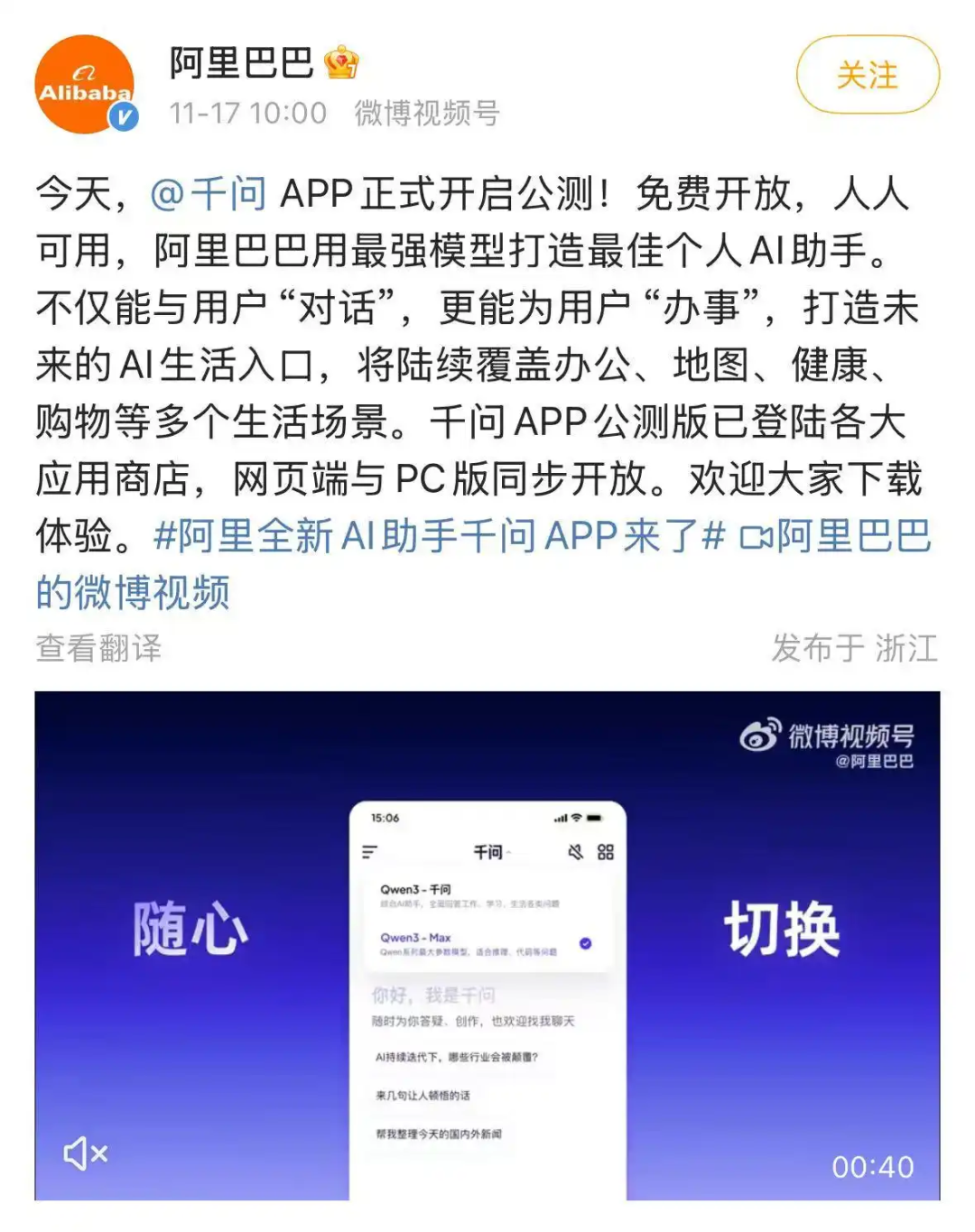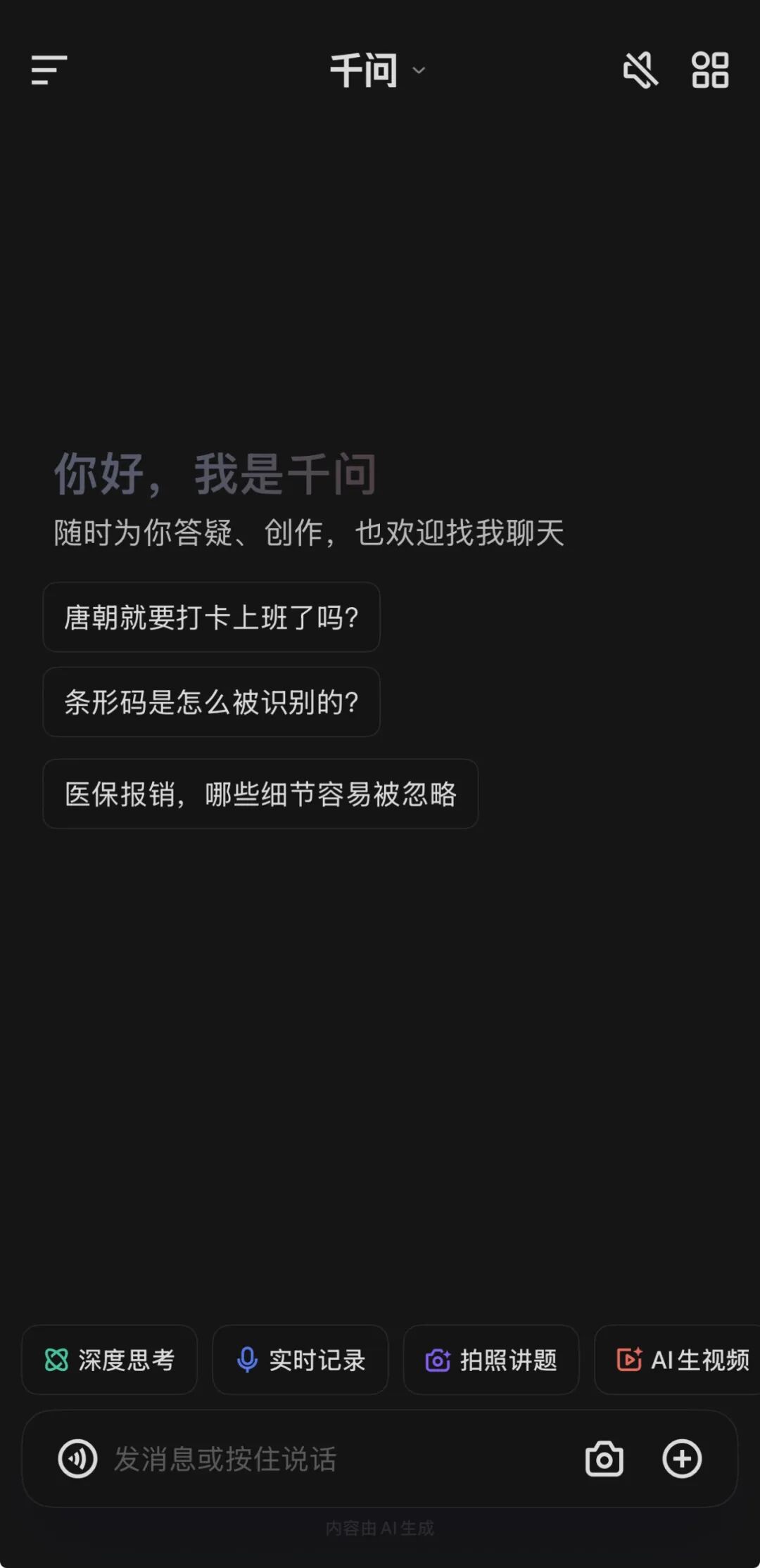Qianwen Renamed and Elevated: Potentially Alibaba's AI-to-C 'WeChat'
![]() 11/19 2025
11/19 2025
![]() 449
449
Alibaba has unveiled its AI-to-C offering, akin to a 'WeChat' in the AI realm.
Before the Qianwen App's debut, phrases such as 'closed development,' 'secret project,' and 'full benchmarking against ChatGPT' set the stage, piquing the curiosity of both the industry and users, who all anticipated a significant move from Alibaba.
On November 17, Alibaba formally announced the 'Qianwen' project, with the Qianwen App now available in public beta.

Image Source: Screenshot from Alibaba's Weibo post on the Qianwen App's public beta
Its descriptions were updated as early as last week. For instance, in the App Store, 'Qianwen' is now described as 'Alibaba's most powerful model's official AI assistant,' offering dialogue-based Q&A, intelligent writing, and a versatile camera with multimodal capabilities.
From Tongyi to Qianwen: A Name Change Signifies a Shift in Destiny
However, many people's initial reaction was: 'Is that all?' Isn't it just a rebranding of the previously low-key Tongyi App? During my trial, I noticed that when sharing Qianwen App's conversation results to WeChat or Moments, the source still displayed 'Tongyi.' The domain name for Qianwen's PC official website also remains 'tongyi.'
Clearly, it's more than just a name change. The 'Qianwen' App's update was personally overseen by Alibaba's Chairman and CEO, Daniel Zhang Yongming, who rallied over 100 engineers to secretly develop it for months in a dedicated two-floor office space at Alibaba's Hangzhou headquarters.
A name change can indeed alter destiny. Alibaba's core management views the Qianwen project as the 'future battle in the AI era,' aiming to create a 'personal AI assistant capable of chatting and accomplishing tasks' using the most advanced models, with the strategic goal of becoming the future gateway to AI-powered living.
This signifies that Qianwen is Alibaba's new ace for fully entering the AI-to-C (consumer) market and unifying its AI-to-C brand.
Before Qianwen, Kuake was the industry's default representation of Alibaba's AI-to-C layout, even more prominent than the Tongyi App.
The latter was even 'demoted' at one point. On December 18, 2024, multiple independent sources reported that the Tongyi App was split from Alibaba Cloud and merged into Alibaba's Smart Information Business Group. Following the adjustment, the Tongyi PC and App teams were on par with the intelligent search product 'Kuake,' while the original Tongyi Lab remained within the Alibaba Cloud system.
This indicates that Alibaba has been striving to clarify the boundaries between AI-to-B and AI-to-C through organizational and business adjustments.
Previously, Alibaba's large model family 'Tongyi,' including the application-layer 'Tongyi' App and PC version, belonged to the Alibaba Cloud system. Among them, the Tongyi large model family was developed by DAMO Academy, primarily focusing on basic science and innovative technology research. Meanwhile, Alibaba Cloud is a To B business, unsuitable for direct investment in To C market application development and promotion.
In March of this year, Alibaba first clarified that Wu Jia would serve as Vice President of Alibaba Group and CEO of Kuake. For Kuake, after upgrading to an 'AI super frame' and welcoming an independent CEO, its strategic position within the Alibaba Group has been elevated to an unprecedented level.
At that time, Wu Jia optimistically predicted that a super AI application with over 100 million DAUs would emerge in the first half of 2025 or 2026, stating, 'We aim to be the first.'
Recently, the long-rumored 'C Plan' within Alibaba was made public: Kuake launched an AI conversation assistant, merging search with conversational AI into a single entry point.
From a product perspective, Kuake's upgrade follows a familiar path: instead of creating a new standalone AI application, it continues to expand scenarios by adding new AI features to Kuake—the AI conversation assistant superimposed with the AI 'super search box,' moving Kuake toward becoming a 'one-stop AI application.'
This has been humorously referred to as Kuake 'cramming in' a Doubao. The industry is also speculating: Is Kuake trying to absorb Tongyi?
Qianwen: Alibaba's AI-to-C 'WeChat'
This outcome did not materialize; instead, Qianwen was thrust into the spotlight as Alibaba's newly promoted AI application. This has also raised a new question externally: Is this Alibaba's convoluted approach to AI-to-C, engaging in internal competition and redundant construction?
In my view, the 'Qianwen' project represents a strategic recalibration. Its logic can be likened to Tencent's path of 'replacing QQ with WeChat.'
In 2011, Tencent already had QQ, a national-level application with over 700 million monthly active users. However, facing the mobile internet wave, Pony Ma still raced to develop WeChat.
The reason is straightforward: QQ was built during the PC internet era, designed for desktop chatting. WeChat, on the other hand, was reconstructed for the mobile internet, better suited to become the 'infrastructure' App for mobile smart devices like smartphones.
No matter how much QQ optimized, it would be hindered by historical baggage in new application scenarios like 'scan,' 'Moments,' and 'Mini Programs,' unable to keep up with the rapid iteration of the mobile internet. For example, QQ couldn't easily remove its online status feature.
Today's Kuake resembles QQ of that era. Launched in 2016, it was initially positioned as a lightweight browser or a streamlined version of UC Browser, later adding features like cloud storage, scanning, novels, and college entrance exam volunteer services, shifting to 'search' to provide intelligent information services.
Until its AI transformation in 2024, aiming to become an all-round AI assistant, it took on the responsibility of exploring Alibaba's AI-to-C strategy. However, its core interaction remains 'input keywords → return results,' essentially still search-driven information distribution rather than task-driven intelligent agency (Agentic AI).
This highlights the drawbacks of Kuake as an AI gateway: historical feature accumulation and a cumbersome system, which to some extent weaken users' perception of its new AI attributes. For instance, many users have reported issues like Kuake providing 'irrelevant answers' or 'forcing AI responses before showing results.'
More critically, Kuake lacks the ability to orchestrate Alibaba's ecosystem—it cannot directly access Taobao orders or link with Amap routes or Fliggy inventory. In the competition for AI gateways, such 'island-style AI' is destined to lose out.

Image Source: Screenshot from Qianwen App
In a sense, its difference from the 'C Plan's target competitor—the 'Doubaos'—lies not in traffic but in product paradigm.
In terms of traffic, Kuake and Doubao are nearly on par under the 'power of massive acquisition' strategies. AI product rankings show that in September this year, Kuake ranked second globally after ChatGPT and first domestically in monthly active users, with Doubao close behind.
In terms of product paradigm, ByteDance's 'expansion and renovation' of Doubao continues, with Chatbot experiences becoming more AI-native. For example, within the Douyin App, when a user asks, 'What are some affordable sunscreens suitable for oily skin?', Doubao can not only list options but also directly insert product cards, redirect to livestreams, and enable one-click purchases. This 'question-and-answer-to-purchase' path is reconstructing the logic of e-commerce traffic distribution.
Tencent Yuanbao is also rapidly integrating services within the WeChat ecosystem: checking express deliveries, booking flights, and making medical appointments are all completed through AI conversations, becoming Tencent's flagship AI application.
If Alibaba continues with Kuake's approach, it would effectively cede the C-end AI gateway to competitors. Once users become accustomed to buying daily necessities in Doubao or booking hotels in Yuanbao, Taobao could be reduced to a 'background shelf,' losing its initiative.
This necessitates Alibaba to reassess: the new gateway in the AI era must be designed for agents from the outset, rather than patching up old frameworks.
Qianwen is Alibaba's AI-to-C 'WeChat'—it's not another Kuake but an operating system-level gateway for the AI-native era, a super personal AI agent reconstructed from the ground up.
According to currently available information, the Qianwen model has been widely applied within Alibaba's ecosystem. During the 2025 'Double 11' period, Taobao's 'AI Universal Search,' 'AI Art Design,' Fliggy's AI travel planning, and DingTalk's AI spreadsheets were all powered by the Qianwen model.
In the future, the Qianwen App plans to integrate various daily life scenarios, including maps, food delivery, ticket booking, office work, learning, shopping, and health, endowing it with even stronger capabilities to accomplish tasks.
Additionally, Alibaba plans to gradually add Agentic AI (intelligent agent) functions to Qianwen in the coming months, supporting natural language shopping on platforms like Taobao and Tmall. For example, users can simply tell the AI, 'Help me buy a winter down jacket,' and the AI will automatically search, compare prices, place orders, and track deliveries.
This is precisely what Daniel Zhang Yongming meant when he said, 'Large models are the next-generation operating systems.' Its core implication is that all services will be orchestrated through large models, eliminating the need for users to open multiple Apps.
Simply put, Qianwen's goal is not to 'give users another App' but to 'make this AI App the only one users need in the future,' allowing them to solve all problems with just one Qianwen App when they're out and about.
Of course, Kuake will continue to exist, with its positioning slightly adjusted to serve specific scenarios as an efficient tool. However, the true AI battleground will be handed over to Qianwen.
Just as QQ remains active among students, Tencent's future has already been bet on WeChat and its ecosystem. Their collaboration can be described as:
One defends, one attacks.
One repairs old ships, one builds new fleets.
Alibaba still hopes to personally control the AI gateway. As Long Ge once said, 'WeChat aims to connect people with services.'
Today, Daniel Zhang Yongming can also say, 'Qianwen aims to enable large models to orchestrate all services.'
References:
36Kr, 'Qianwen Officially Launches: Alibaba is Serious About Creating an AI Application'







